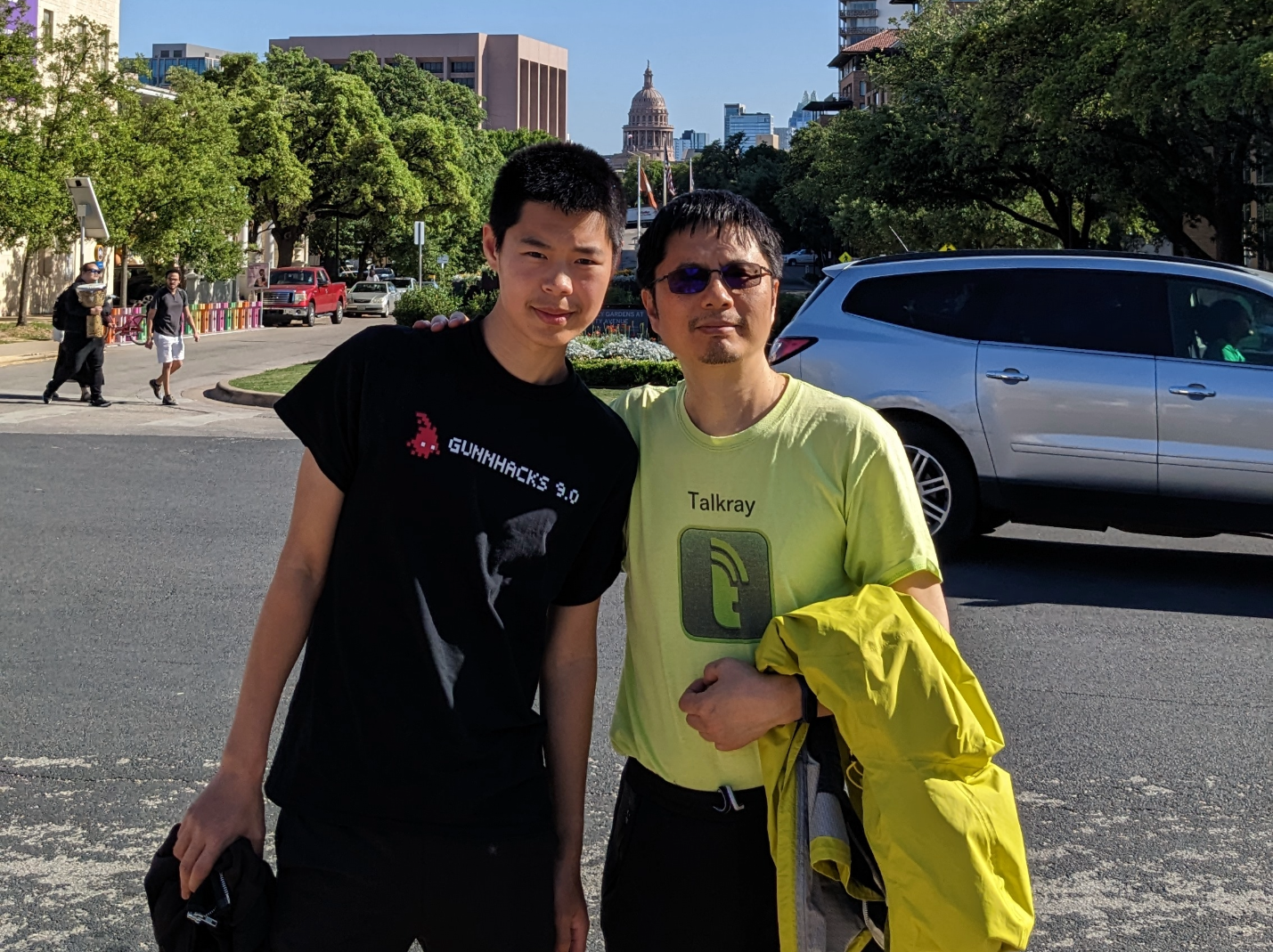
Representing ourselves, my son and I just filed lawsuits against the University of California, the University of Washington, the University of Michigan, and Cornell for discriminating against Asian Americans in their admissions. The LA Times, Fox News, and New York Post covered our lawsuits.
In short, at age 18, co-plaintiff Stanley Zhong was hired by Google for a PhD-level position after being rejected by 16 colleges for undergraduate admission. His college application story was cited in a congressional hearing in 2023. More details on Stanley’s achievements as a high schooler—including his 1590 SAT score, creating an unlimited free e-signing service featured by Amazon Web Services, advancement to the Google Code Jam and Facebook Hacker Cup semifinals, second place finish in the MIT Battlecode, and highest-level Presidential Volunteer Service Award—are outlined in our legal complaint, submitted under penalty of perjury, and on our website.
In each lawsuit, we documented: Absurd individual admission cases; statistical racial disparity; racial intent; and whistleblower reports.
In response to our lawsuit, the University of California retained WilmerHale, which defended Harvard in SFFA. Similarly, the University of Washington retained Orrick, another top law firm with 1000+ lawyers. Last week, Orrick put Rob McKenna, the former Washington State Attorney General, in charge of their defense. It is funny that they are pulling out the big legal guns to battle two pro se litigants. Our use of artificial intelligence (AI) to draft legal complaints seems to work.
After filing the lawsuits, I sent public debate challenges to more than 10 vocal supporters of Harvard on the SFFA case. None replied. Based on my observation, there are two motivations for supporting racial discrimination in college admissions: (1) a sense of historical guilt and social justice; (2) self-promotion.
While the second motivation is blatantly hypocritical, I can understand the first. That said, any proposed remedies should be funded through private resources, not public funds or the assets of others without their consent. Moreover, the real issue lies in the K–12 education system, which we must address rather than wallpapering over it. Both motivations are driving forces behind “diversity, equity, and inclusion” (DEI) initiatives. Even if DEI began with a noble goal, in practice, it often reduces people to their skin color and treats them accordingly, leading not to diversity, equity, and inclusion, but to division, exclusion, and ultimately, insanity. It has become a cure worse than the disease. When either motivation is taken to an extreme, it may explain the intellectual dishonesty we now witness—for example, the repurposing of language. In President Kennedy’s executive order, “affirmative action” clearly referred to banning racial discrimination. Yet today, some insist it means the opposite. If they were being honest, why not simply call it what it is: “racial preference?”
Harvard is a textbook example of hypocrisy. Before it waves the banners of social justice and academic freedom, Harvard should immediately abolish legacy admissions, stop ranking dead last in FIRE’s free speech index, and issue an apology for the harm it caused Asian Americans, as affirmed by the SFFA ruling. If universities genuinely care about the public interest and social justice, they should reduce tuition and share student loan responsibility. Otherwise, they will continue creating or sustaining degree programs of questionable value that leave students burdened with crushing debt.
Marxism’s resurgence on college campuses is hardly surprising. It consistently attracts followers under the banner of “social justice,” enabling some to justify self-destructive, zero-sum thinking while giving others a platform for self-righteous virtue signaling. Historically, Marxism has excelled at tearing down what it labels the “old and rotten world,” yet time and again, it has failed miserably to build anything better in its place. Worse still, it has repeatedly led to massive human tragedies. At its core lies a warped, zero-sum worldview—one that fundamentally misunderstands human nature and basic economics. The real question is: how much damage will it inflict before yet another generation awakens to its toxic consequences?
I was born during China’s Cultural Revolution in the 1970s, and it’s uncanny to see some of the same tactics reemerging in America half a century later. Take, for example, punishing individuals without clearly stating their offense, as in the case of Professor Perry Link, or treating people differently based on immutable characteristics. With its political agenda ruthlessly trampling academic excellence and all else, the Cultural Revolution crippled an entire generation’s education and plunged the economy into ruin.
One of the most troubling patterns of the Cultural Revolution was how each wave of radicals quickly turned on the last. The initial Red Guards, once celebrated as revolutionary vanguards, were soon denounced as insufficiently revolutionary and cast aside by a more extreme faction. This cycle repeated itself, with each new group pushing the boundaries further, until the most radical elements seized power, ultimately destroying the economy. When Professor Erwin Chemerinsky had his backyard party taken over by student activists, I wonder if he recognized his own role in enabling it by championing “unstated affirmative action” and, in doing so, helping to subordinate academic excellence to political agendas.
You Can Help: While we have whistleblower reports regarding the secret use of race at each of the universities sued, we are actively collecting more for both student admissions and faculty hiring, whether anonymous or not. If you have any leads or comments, please email me at [email protected].
Image submitted by the author.

Zhong should have told his son to apply to some right-leaning colleges such as Hillsdale, Patrick Henry, Bob Jones, George Mason, Liberty, Texas A&M, BYU, etc. Most, if not all, would have admitted him and perhaps with a full-ride scholarship.
But being hired for a PhD-level position at Google is a nice consolation prize.
Hopefully, Zhong didn’t influence the hire because he also works at Google and the hire didn’t come at the expense of other applicants who were similarly qualified, but didn’t know someone who already worked there.
It would be interesting to hear the reasons for his rejection by 16 schools. It seems that there must be something missing here.
Google hired him — so the things you insinuate can’t be true.
A lawsuit includes “discovery”, so the 16 schools will have to tell him, and it might be as sketchy as the reasons Harvard gave for not admitting specific Asian students in the SFFA case. And for all we know, he may be a conservative Republican and admitted to being one — that *would* likely cost him admission to most places….
It also could be that he didn’t “act” Asian — I had a UMass administrator once tell me that there are Asian “cultural standards” which all “Asians” will meet — I didn’t consider it wise to call her the Nazi bigot she was.
Japanese, Chinese, Vietnamese, Cambodian — these are people who have hatreds that go back thousands of years. I have yet to meet an actual Asian — i.e. someone who describes himself/herself/itself as “Asian.” It’s always Japanese, Chinese, Vietnamese, Cambodian — there are distinct identities outside of the American university.
And maybe he wrote about how much he loved America. That’d have cost him….
We shall see…
Yes something is missing here:
Equality under law.
Something similar happened in Massachusetts:
https://jamesgmartin.center/2025/05/american-colleges-are-building-a-new-elite/
I was born during China’s Cultural Revolution in the 1970s, and it’s uncanny to see some of the same tactics reemerging in America half a century later.
While we haven’t seen the murder (and cannibalism) yet, the other uncanny thing is the practice of personal destruction. Older professors forced into retirement have the retirement to fall back on, but I’ve seen undergrads reduced to destitution because they are blacklisted from everything else.
Our best and brightest wind up driving trucks or waiting tables…
.
One of the most troubling patterns of the Cultural Revolution was how each wave of radicals quickly turned on the last.
That unfolded 170 years earlier in France. Read Edmund Burke’s 1790 Reflection on the Revolution in France — a book that has been banned in China since 2020.